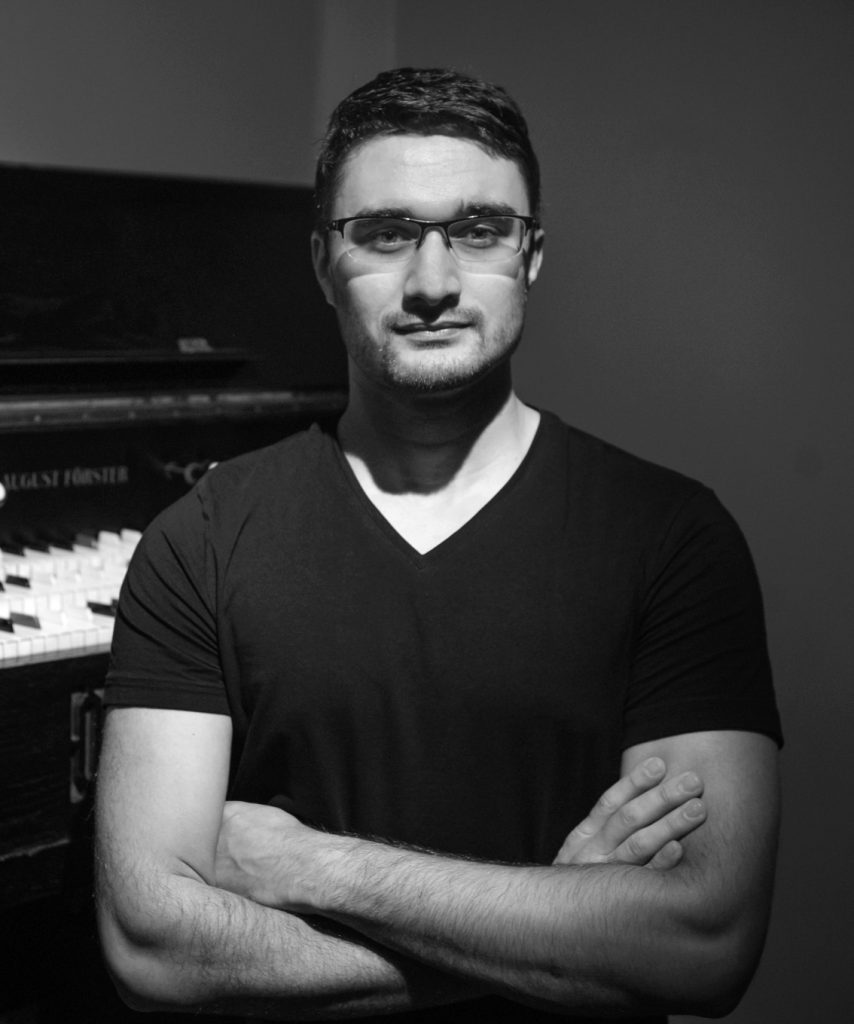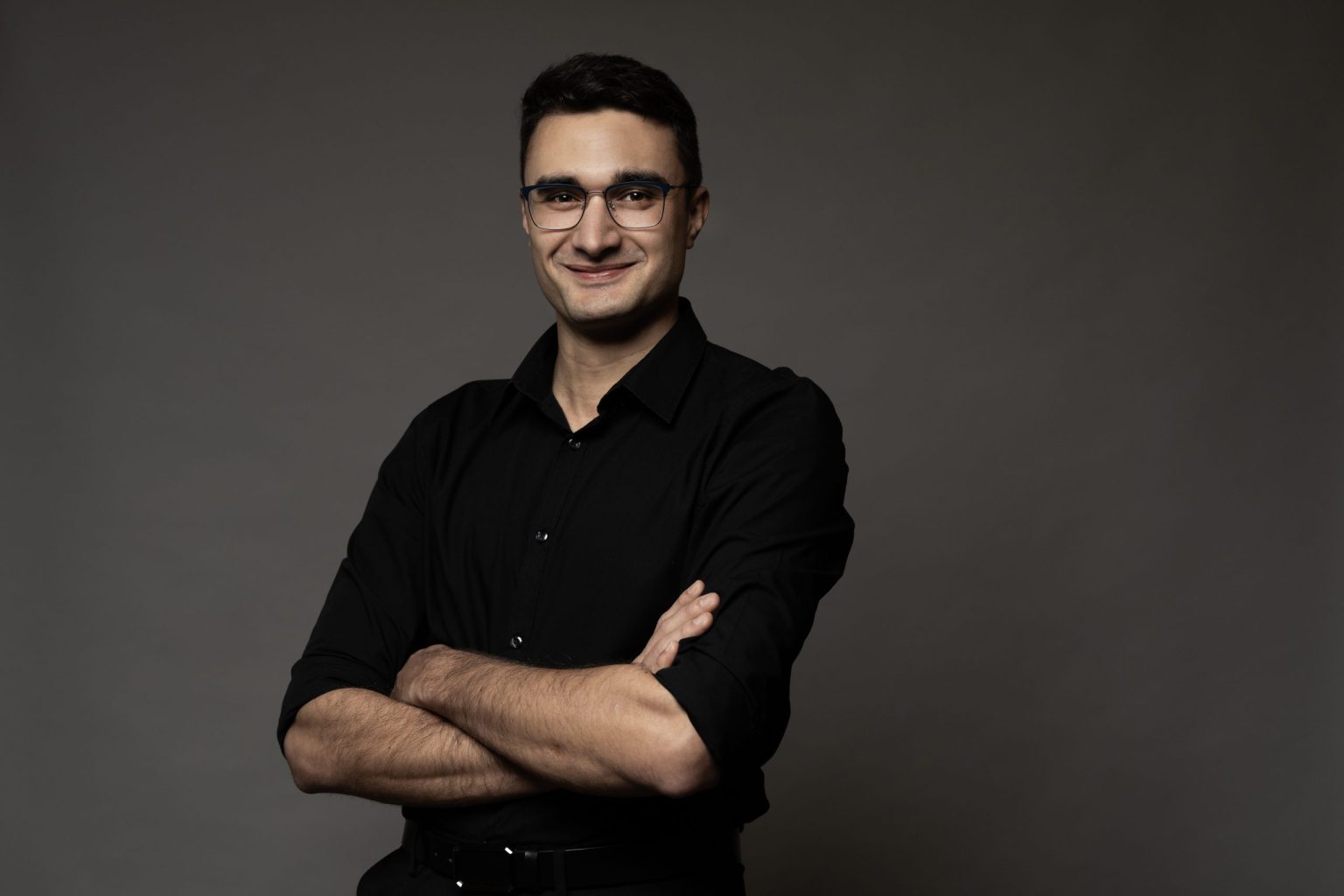interview by Jan Pudlák
Born in Ostrava, pianist Miroslav Beinhauer (1993) is becoming an increasingly sought-after interpreter of contemporary music. This April, he released the complete quarter-tone works for solo piano by Alois Hába on the Supraphon label. The recording attracted significant international attention—British critic Norman Lebrecht noted it, and it received praise from the French magazine Diapason and the outlet Stretto. Beinhauer is the only person in the world capable of performing on Hába’s unique sixth-tone harmonium. In 2018, he took part in the premiere of Hába’s sixth-tone opera Thy Kingdom Come and subsequently continued with the premiere performance and recording of Hába’s only solo opus for the instrument—Six Pieces for Sixth-tone Harmonium, Op. 37. Since then, he has collaborated with numerous prominent composers, including Phill Niblock, Klaus Lang, Bernhard Lang, Georg Friedrich Haas, Marc Sabat, Adrián Demoč, and Petr Bakla. Pianist and jazz musician Jan Pudlák spoke with Miroslav Beinhauer, whose move to Prague was motivated, among other things, by the presence of the sixth-tone harmonium.
You’ve played piano since early childhood. When did your path shift toward contemporary music?
I began to specialise in contemporary music relatively late. During my time at the music-focused high school and during my bachelor’s studies at JAMU, my education was rooted in classical training. The turning point came during an Erasmus stay in Vienna. Initially, I had intended to focus on works by Liszt and Beethoven, but that was also where I first encountered contemporary music in a more intense way. I was 21 years old. I received great support from Professor Helena Weiser at JAMU, who was open to new directions and encouraged my interests, including studying abroad. After returning from Vienna, I decided to dedicate myself systematically to contemporary music and continued my studies in Ghent, Belgium, with Daan Vandewalle. There, I finally encountered an institution with a modern approach to contemporary music and active collaboration with composers.
Let’s talk a bit about Daan Vandewalle. What were your lessons with him like?
Daan Vandewalle is a remarkable figure—an outstanding pianist and teacher. His lessons always gave me exactly what I needed, even if they were often unpredictable in structure. Sometimes I was assigned demanding Ligeti études to prepare for the next session, while other times we would spend two hours just discussing piano technique, composers, or music and art in general. His lessons were fantastic.
His playing style is very expressive and visually intense, which differs quite a bit from my own, more introverted manner. Lately, I’ve been wondering whether it might be useful to incorporate more affect into my interpretation in order to reach less experienced audiences more effectively (laughs). Daan used to say that piano playing is a kind of theatre and that you need to know how to “sell” it—but I think it depends on the specific piece. For example, theatricality wouldn’t work at all in the music of Petr Bakla.
How did your collaboration with composer Petr Bakla begin?
It started at the Ostrava Days festival, where in 2019 I was invited to perform Petr’s piece No. 4 for solo piano. As soon as I saw the score, I realised it was an exceptional challenge—both musically and interpretively. But the work on this piece was incredibly fulfilling, and despite its difficulty, I truly enjoyed both learning and performing it. Since then, our collaboration has deepened, and we’ve released three albums of his music so far—solo and chamber works. I perform his pieces regularly. Petr’s music is brilliant, unique, original, and always a joy to interpret.
Which performers and ensembles do you collaborate with regularly?
I work regularly with cellist Matthias Lorenz. We first performed together at Ostrava Days in 2021 in a piece by Miroslav Srnka. Since then, we have formed the official duo Lorenz/Beinhauer. In 2022, we prepared Feldman’s Patterns in a Chromatic Field, which we performed across Central Europe. The collaboration continues intensively—we released a CD of works by Petr Bakla and recently completed a Czech-German-Austrian tour with new pieces by Klaus Lang, Bernhard Lang, Adrián Demoč, Petr Bakla, and Thuon Burtevitz.
I’m a member of the Ostravská Banda ensemble, a regular participant in the Ostrava Days festival, and active in various projects of the Ostrava Centre for New Music. I also frequently collaborate with the Brno Contemporary Orchestra—this year we premiered Petr Bakla’s Piano Concerto No. 2 and Ian Mikyska’s new piece Neither together nor not together, where I played the Lumatone (an advanced MIDI controller with 275 backlit keys, designed for musicians exploring microtonal tuning and alternative playing systems).
You seem to jump from one project to the next with hardly a moment’s pause. How did you continue developing after your studies, once you no longer had a teacher as a guiding figure?
That’s a good question. The truth is, during your studies, your teacher guides you not just artistically but also personally, and I still draw on what I learnt from Zdeněk Pěček in high school and Helena Weiser at the academy. Throughout life, your goals change from time to time, but right now I know I want to earn my living as a pianist—hopefully also playing the sixth-tone harmonium. Specialising in contemporary music, however, isn’t easy. There aren’t many opportunities—few festivals are willing to present contemporary repertoire, and few promoters or programmers are open to new forms. On the other hand, there aren’t many pianists focusing on contemporary music either, which balances things out a bit. Plus, if a musician is active, opportunities always arise.
What’s your relationship to classical piano repertoire? Do you still find time for ‘older’ music amid the flood of new pieces?
Recently, I returned to Liszt after a long time, and it was refreshing in many ways. But every time I go back to older music, I’m acutely aware of its historical distance from what we experience today. I likely couldn’t play only works composed with traditional methods, firmly grounded in their historical era—I would probably get bored.
Besides Liszt, I also enjoy Brahms and Schumann; generally speaking, large Romantic forms suit me well technically. I’m also fascinated by the transition between Romanticism and early Modernism, when composers like Debussy or Scriabin began exploring new musical paths. That moment of searching and stylistic blending continues to captivate me, and I hope it comes through in my most recent album with works by Alois Hába.
In the Czech Republic, in my experience, there’s still a strong divide between the classical and contemporary classical scenes—even though it’s all classical music! Personally, I feel part of both worlds, which was also the case with the aforementioned Alois Hába.
Has anyone from the Czech ‘piano establishment’ tried to discredit you for focusing solely on contemporary music? I mean, have you ever encountered remarks like “he’s not one of us, always playing that modern noise”?
Yes, during my time at the academy and even afterwards. But the older I get, the less I care what others think. I’ve always followed my own path—often not a well-trodden one—which made me value it all the more. Such remarks almost always stem either from a lack of context or from an unwillingness to consider another perspective. I completely exclude such people from my life—they’re not important to me. On the contrary, I surround myself with those I feel good around and who are interested in what I do.

Do you feel it’s mostly a generational thing, this resistance to contemporary works?
No, unfortunately… I’ve seen it even among young musicians in Czech orchestras—whom I’ve worked with the most—who often refuse to play newer pieces simply because they’re unfamiliar or they don’t feel like practicing them. Often, they’re influenced by their professors, who tend to be conservative themselves. During rehearsals with orchestras and conductors, I’ve encountered shocking levels of unprofessionalism from some players: arrogant comments about the supposed quality of the music or performing “half-heartedly”—this has happened in the context of new piano concertos. Not only is it embarrassing, but it’s also extremely unprofessional. In such situations, it really helps to show up as a soloist fully prepared, with a clear vision for the piece—the professional attitude can inspire the orchestra to follow suit.
What are your upcoming plans?
I’ve been invited to Poland to perform at the Sanatorium of Sound festival, where in August I’ll present works by Phill Niblock and Ian Mikyska on the sixth-tone harmonium. At this year’s Ostrava Days, I’ll be performing around ten pieces, including Ian Davis’s new piano concerto and several notable chamber works (by Christopher Butterfield, Petr Kotík, and others) with fantastic musicians from Ostravská Banda. In the fall, I have a concert series with Austrian composer and organist Klaus Lang, where we’ll perform his piece for organ and piano, among other works. I’ll also appear at the Moravian Autumn festival, playing piano works by Mikalojus Konstantinas Čiurlionis and premiering a new piece by František Chaloupka for clarinet, piano, and choir—alongside clarinettist Anna Paulová and the Lithuanian chamber choir Aidija. In November, I’ll premiere another piece by Chaloupka—a double concerto for cello and piano—at the MusicOlomouc festival. Next year, I’m preparing a premiere with the Berg Orchestra of a new piano concerto by Adrián Demoč, which I’m especially looking forward to!
Thank you for the interview!




